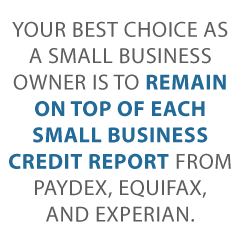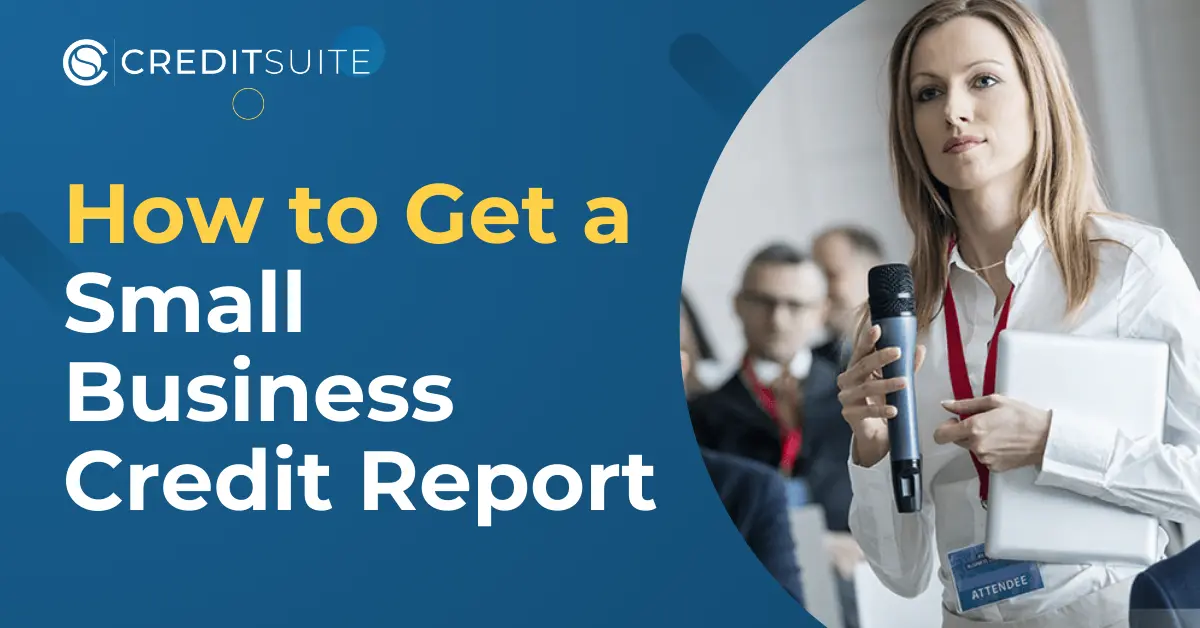You Can Get a Small Business Credit Report
 Get your small business credit report today.
Get your small business credit report today.
Your best choice as a small business owner is to remain on top of each small business credit report from PAYDEX, Equifax, and Experian. These are three big credit reporting bureaus for small business and you absolutely should check all three of them routinely.
This is because they use moderately different yardsticks. Hence moving the needle for one can move the needle for both of the others, though maybe not as much.
Do not let your company credit scores slide. Because you need to catch any errors soon as you can. And also spot anything which is pulling your scores down and then take corrective measures. You can acquire your reports easily and stay right on top of all three scores by following a few basic steps.
Dun & Bradstreet’s Small Business Credit Report
It’s all about the PAYDEX Business Credit Score.
A PAYDEX Score on a Dun & Bradstreet small business credit report ranges from 0 to 100. This score has a basis in payment information which is on report to the bureau. Or it is on report to data-gathering firms partnering with the CRA. See: https://creditreports.dnb.com/m/business-glossary/paydex-score.html
D & B uses this data, along with a credit score and Financial Stress Score, so as to advise how much credit a lender should extend to your company.
Getting a PAYDEX Score
To get a PAYDEX score, you have to apply for a D-U-N-S number by using Dun & Bradstreet’s site. The number is for free. Plus, the CRA will need to have records of your payments with four or more sellers.
Your firm’s PAYDEX score shows if your payments are normally made promptly or ahead of schedule. As you may expect, a higher number is better.
PAYDEX Score Details
The scores break down as follows:
- 80 – 100: A low risk of late payments
- 50 – 79: A medium risk of late payments
- 0 – 49: A high risk of late payments
D&B Business Credit Scores
Your business’s credit rating runs from 1 to 5. 1 is the best score. This matches your company with various other companies with similar payment histories. The score demonstrates how frequently those companies often tend to pay without delay.
This data can really assist lending institutions to recognize your business’s standing. Yet it does not truly mirror every one of the payment documents from your company.
Financial Stress Score
The Financial Stress Score likewise ranges from 1 to 5. It matches your company with various other business sharing similar financial and business characteristics.
These resemblances are in areas such as size or amount of time in business. This score shows exactly how regularly those businesses tend to pay in a timely manner. As before, 1 is the best score. This rating is a more detailed examination of the business landscape, versus an evaluation of your business’s real payment history.
An outstanding PAYDEX score for your business is 80 – 100.
Equifax Small Business Credit Report
The Equifax Credit Risk Score originates from a model which they use to rank certain risks. Equifax uses these details in its calculations, consisting of the depth of the credit information Experian can get the length of your company’s credit history, and your business’s payment delinquency history. See: https://www.equifax.com/business/equifax-risk-score
Equifax then segments some 5 separate scorecards with each other, by using statistical analysis. In order to improve their precision, Equifax recommends incorporating their Credit Risk Score with their exclusive Equifax Bankruptcy Navigator Index.
The Bankruptcy Navigator Index helps forecast the possibility of your company declaring bankruptcy in the next 24 months. Equifax bases its predictive model on over 270 million separate accounts.
Equifax shows three separate company determinations on its commercial credit reports. These are the Equifax Payment Index, your company’s Credit Risk Score, and its Business Failure Score.
Equifax Payment Index
Similar to the PAYDEX rating, Equifax’s Payment Index, which has its measurement on a range of 100, shows how many of your company’s payments were made punctually. These consist of both data from credit issuers as well as vendors.
Yet it’s not implied to forecast future behavior. That is what the other two scores are for.
Equifax Credit Risk Score
Equifax’s Credit Risk Score examines just how most likely it is your company will end up being drastically delinquent on payments. Scores range from 101 to 992, and they examine:
- Available credit limit on revolving credit accounts, e. g. credit cards
- Your business’s size
- Evidence of any type of non-financial transactions (e. g. vendor invoices) which are overdue or were on charge off for two or more invoicing cycles
- Length of time since the opening of the oldest financial account
Equifax Business Failure Score
Finally, Equifax’s Business Failure Score looks at the risk of your small business closing. It ranges from 1,000 to 1,600, reviewing these elements:
- Total balance to total current credit limit average utilization in the previous three months
- The length of time since the opening of the oldest financial account
- Your company’s worst payment status on all trades in the previous 24 months
- Documentation of any kind of non-financial transactions (e. g. vendor billings) which are past due or have actually gotten on fee off for two or more billing cycles.
Equifax Scoring Analysis
For the credit risk and business failure scores, a rating of 0 means bankruptcy.
An incredible Equifax score for your business is as follows:
- Payment Index 0 – 10
- Credit Score 892 – 992
- Business Failure Score 1400 – 1600
Experian Small Business Credit Report
Experian’s scoring system is called Intelliscore Plus. See: www.experian.com/business-information/credit-risk-management
What is the Intelliscore Plus Credit Score?
The Intelliscore Plus credit score is a statistically based credit-risk examination. The crucial function of Intelliscore Plus is to help companies, investors, and possible future lenders make wise judgments about who they should or should not do business with.
Like a car dealership uses a customer’s FICO score to rapidly figure out just how much of a credit risk a prospective customer may be, the Intelliscore Plus credit score can give insight on just how much of a credit risk a business or company owner might be.
Intelliscore Plus Credit Score Range
The Intelliscore ratings vary from 1 to 100. So, the greater your score, the lower your risk class. The chart below details each Intelliscore Plus credit score range and its associated meaning.
Score Range/Risk Class
- 76 – 100 Low
- 51 – 752 Low – Medium
- 26 – 503 Medium
- 11 – 254 High – Medium
- 1 – 105 High
Computing an Intelliscore Plus Credit Score
In the credit world, Intelliscore Plus is regarded one of the most reliable tools in successfully forecasting risk. One of the ways Intelliscore Plus maintains this claim to fame is by identifying the major variables that reveal if a business is likely to pay their debts.
Though there more than 800 business and owner variables making up an Intelliscore Plus credit score, the variables can be broken down into these essential factors:
Payment History
The bureaus call this recency yet in the real world, it’s nothing more than your current payment status. This includes the number of times your accounts end up being delinquent, the number of accounts that are currently overdue, and your overall trade balance.
Frequency
Much like payment history, frequency represent the quantity of times your accounts have been sent out to collections, the quantity of liens as well as judgments you may have, and any bankruptcies connecting with your company or personal accounts.
Frequency can additionally include information relating to your payment patterns. Were you regularly slow or late with payment? Did you start paying costs late, yet over time, stopped doing so? These aspects will certainly all be considered.
Monetary
This specific aspect concentrates on how you make use of credit. For instance, how much of your available credit is presently in use? Do you have a high proportion of delinquent balance in contrast with your credit limits?
If you will start a business or are fairly new to this game, the list above might seem a bit overwhelming. If you have not begun or don’t have a long history of firm-based transactions, how will Intelliscore Plus rate you?
Intelliscore Plus handles these scenarios by using a “blended model” to develop your rating. This indicates that they take your individual credit score right into factor to consider when determining your business’s credit score.
FICO Small Business Credit Report
FICO uses its SBSS (Small Business Scoring Service) Score to combine consumer agency, financial, application, and business bureau information. Then, FICO validates their SBSS models for transactions such as Credit line transactions, Term Loans, and Industrial Card obligations which go up to $1 million. Their idea is to evaluate how your company pays back all kinds of loans. See: FICO.com
Business credit providers use the FICO SBSS score as a tool to decide whether they should authorize a loan to your small business at all.
The SBA uses this score too, to authorize or approve company loans. It has a basis in your company and consumer credit history as well as not just your business’s financial health.
The score factors in the analysis of the risks inherent in your company’s credit applications. With SBSS, loan providers make their decisions in a matter of hours, rather than days. Lenders are more confident in their lending judgments, and your business gets faster decisions on your loan applications.
The SBA’s Participation
The FICO Small Business Score or SBSS score is the primary figure that the SBA thinks about while establishing to accept a loan, especially when it involves the SBA’s 7(a) loans.
Computing a FICO SBSS Score
The FICO SBSS Score shows the likelihood or probability of you, the candidate, covering your month-to-month expenses on time. The score runs from 0 to 300. A higher score means reduced risks and usually produces more favorable credit terms. The score originates from your company and personal history of credit usage together with your company’s financial information. Variables also include your company’s age, as well as its years or complete time in business.
As of 2014, all SBA 7(a) loans must go through a business credit score pre-screen, as well as for SBA loans, you can possibly not get an approval if you had a score less than 140. Yet the cutoff was typically set to 160, and often, a score under 160 meant a denial. A lot of lenders will just accept scores above 160 or 180, to lend as much as $1 million. Yet a score lower than 160 or 180 can still qualify you for a smaller sized loan.
The formula for the FICO SBSS Score is as follows:
- The last year of PAYDEX scores from Dun & Bradstreet
- Amounts and types of any judgements against your firm
- The amounts and kinds of any liens against your firm’s real or personal property.
- Your business’s available resources
- Your business’s profit
- Plus, other, less distinct monetary details
If you have no document of company credit and had a modest or short time in your business, then the possible highest FICO SBSS score you can potentially anticipate is 140.
Usage and Kinds of SBSS Model Lenders
A FICO SBSS score includes the choice to choose specific models which are market-specific for improved and better decision making. For instance, one model is a farming leasing and lending model. Another model was made specifically for Canada. Additionally, the insights of the SBSS score provide support for the SBRI (Small Business Risk Insight, from Dun & Bradstreet) and the SBFE (Small Business Financial Exchange) data databases.
Confirming the SBSS models is necessary for credit lines, commercial cards, as well as term loans of as much as one million dollars. If you are requesting one million dollars or less from bank funding, then there are chances that your SBSS rating will be under review.
The Kind of Data in the Score
The SBSS provides the credit providers of small businesses different information blends to ensure that they can evaluate your business’s credit risks. For instance, a particular issuer of credit can choose only to evaluate a principle owner’s application data, or the credit company can pick to include one or multiple business agencies’ data.
Or the credit issuer can just choose to focus on one facet over another. This smart score originates from different business bureaus on an automated basis, in any kind of order or whatever priority the provider of the credit prefers. Therefore, if the lender chooses the score of Dun & Bradstreet’s PAYDEX as its default, the SBSS will pull that set of data.
SBSS Credit Offer Index: How It Works and Why It Is Important
The Credit Index is an element of the FICO SBSS Credit Score for your business, made to aid credit issuers understand your capacity. It works as the criteria against all the businesses with comparable profiles.
The SBSS Credit Offer Index includes monetary application information, business credit agency records, and credit agency data for customer. Also, it provides a percentile ranking of the present versus other smaller sized businesses with identical or comparable qualities and total requested money from all those companies.
The Updated SBSS
Reporting agencies like D&B power the newer FICO SBSS Score model. Also, the SBFE information may be used to prepare for charge-offs, bankruptcy, or three plus cycles past due or delinquency over a period of two years.
SBA Credit Scoring (a Tool Which is a Lot Like a Small Business Credit Report)
The SBA’s tool has a basis in FICO. Also, their idea is to accelerate their credit decisions for loan authorizations. The tool uses numerous information sources and over one hundred combinations of company and consumer analytical models. They use a designated cutoff. https://www.sba.gov/offices/district/mo/st-louis/resources/small-business-loan-credit-scoring
Their total stats on their over $60 billion portfolio demonstrate that companies with ratings at, or over the assigned cut-off will have great payment history.
Just How Do You Enhance Your Small Business Credit Report?
The big question has arrived, and while there is no golden answer, these concepts can certainly help you increase your score.
Make Your Payments on Schedule
Your payment patterns and history are a driving force in your overall credit score. Over time, paying your bills in a timely manner will help establish your business as one that pays their financial obligations. This will certainly help push your rating up as well as show other firms you are a low risk.
Use Your Credit
Keeping your debts low remains sound guidance. Still, opening and sensibly taking advantage of company credit accounts can help you broaden your available credit and boost your credit rating.
Keep a Healthy Personal Credit Profile
By now, you’re aware that your own personal credit is fair game when it involves your Intelliscore Plus score. Running a company is difficult work, but don’t let your personal finances suffer. Guarantee that you stay on top of your personal monthly expenses, stay clear of unnecessary credit inquiries, and refrain from compromising your personal credit for company needs.
Takeaways on Your Small Business Credit Report
Irrespective of what your credit score is, it is critical that you continue to be diligent and evaluate your personal and business credit reports. This can help you find possible issues and stay educated when it comes to your credit profile.
When you recognize where to check your small business credit report, you have a much better chance of getting on top of it and staying there.

